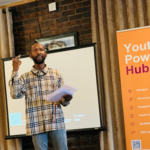Dr Chris Mokolatsie argues that Lesotho’s banking system is exploiting the poor — and that government must act to restore financial dignity.
Dr Chris Mokolatsie
I had two exasperating conversations recently that left me both angry and deeply saddened. The topic? The quiet but relentless extortionate bank fees Basotho are subjected to by the few monopolistic local Banks, and as if that is not painful enough for locals, their relatives outside the country likewise suffer a similar nightmare and extortion when sending little hard-earned cash home to support their loved ones in Lesotho.
The first conversation was with a close relative in Maseru, and another with a friend of mine here in the United Kingdom. Both spoke with frustration about something that has become an open secret in Lesotho and among many Basotho outside the country: the extortionate fees local banks charge for ATM withdrawals and other such bogus fees, and that perennial nightmare of international money transfer to relatives and family in Lesotho.
Apparently, a simple transaction of M5,000 in Maseru costs M379 in withdrawal fees. Let that sink in: M379. I am not sure how much that is worth in Lesotho these days, but here in the United Kingdom, that translates to £16.46, enough to buy a family’s groceries for a few days or pay for several taxi rides across Maseru. Even worse, in some places, such as TY Shopping Centre, customers face a withdrawal limit of M5,000 per transaction. So, imagine transferring M11,000 to pay for building materials only to lose M120 in fees simply to access your own money — your own money! For ordinary Basotho struggling to build homes, pay school fees, or feed their families, this is not just inconvenient; it is cruel.
Banks that bleed the poor
Lesotho’s banking system, it seems, has perfected the art of bleeding the poor. These are not service fees; they are instruments of economic punishment. Each withdrawal, transfer, and inquiry is a toll charged on the mere act of participating in the modern economy. The tragedy is that many Basotho have no choice. Our financial sector is dominated by a few banking institutions that act more like monopolies than service providers. When all the major banks charge similar fees, it ceases to be competition; it becomes collusion under the banner of legality.
Meanwhile, Basotho diaspora, working tirelessly in South Africa, the UK, and beyond, face their own financial wounds. For every M5,000 sent home, a substantial M242.00 portion disappears into the wider banking abyss in the form of third-party international money transfer fees, in some case on top of excessive local withdrawal costs.
This situation has been exacerbated by recent changes introduced in 2024, where low-value electronic funds transfers (EFTs), debit, and credit payments made between the Common Monetary Area (CMA) countries — namely Eswatini, Lesotho, Namibia, and South Africa — are now treated as cross-border transactions and subjected to greater due diligence requirements. What this means in practice is that even small, everyday transfers whether it’s €20.00 from Europe, or £15.00 from the UK or $30.00 from the US, to loved ones and family of friends to buy paraffin, or motlakase or meet other basic needs like school fees for kids and uniforms for siblings, all these transactions phoofo, now face the same bureaucratic and financial hurdles once reserved for large international payments. The poor are paying more to move less. The result? The remittances that sustain families are being eroded by financial intuitions’ collusion and monopolistic greed disguised as financial “policy” to combat international money laundering.
The lost potential of remittances
There is another dimension to this story that the Central Bank of Lesotho seems to ignore: the huge role that remittances play in injecting foreign currency into a struggling economy like Lesotho’s.
For a small country like ours, the central bank should not be making it harder for Basotho abroad and outside the country to send money home to family and relative— it should be making it easier. The easier it is to send money, the more individuals will be inclined to make more money transfers and more likely frequent and to many more people, as we know in countries like Lesotho, one economically active family member often supports not just their immediate family but the larger community of extended family of relatives, friends even neighbours. Small amounts though these transaction may be — whether $10, £12, or €25 — when send frequently and to an ever widening pool of family, relatives and friends, the cumulative effect when converted into Maloti to the local economy is enormous. Gradually, families have more spending power — which benefits not only individuals but also the broader economy and the national fiscus. These modest individual transfers inject liquidity into the economy, strengthening local purchasing power, and in turn supports small businesses. Every remittance, however small, is a small step of individuals into economic development and a giant micro-investment step by Basotho Diaspora collectively in Lesotho’s future and participation into the economy. To obstruct it with red tape and punitive fees as the current financial regulatory regime is not just bad policy; it is self-sabotage, and short sightedness.
An ethical failure
At its core, this is not simply a financial issue — it is an ethical one. The question is not whether banks have the right to charge fees, but whether they have the moral right to exploit citizens so openly. When withdrawing one’s own money becomes a luxury, when families lose a week’s food budget to transaction charges, and when the poor pay more to access less — that is not economics, it is exploitation. And when the government stands by in silence, it becomes complicit in that exploitation. We have reached a point where banking in Lesotho has become a punishment for being poor. The system rewards wealth and penalises survival.
It is time for the Government of Lesotho and the Central Bank in particular to act decisively on the side of customers not banks. The government for its part has both a legal and moral obligation to protect its citizens from corporate excess but introducing legislations abolishing the day light robbery of all ATM withdrawal and inquiry fees that Banks charge, and elimination of interbank service charges when customers use ATMs belonging to different banks.
For Basotho outside the country the government must work with relevant financial institutions locally and in the region and lobby for outright reversal of the September 2024 decision to treat remittance to family and relatives as cross border transfers needing greater money laundering scrutiny, which only serves to cripple Basotho in the diaspora.
This is not radicalism — it is justice. The banks operate within our borders, make profits from our people, and owe a duty of care to the same communities that sustain them.
A call for financial dignity
Lesotho cannot continue to tolerate a banking system that preys on the vulnerable while enriching a few. Access to one’s own money should be a right, not a revenue stream for multinational corporations.
The time has come to restore financial dignity to Basotho. The government must stop protecting banks and start protecting citizens. Because the moral test of any nation is not how it treats its wealthy, but how it defends its poor from the powerful.
Until then, every M379 fee on a M5,000 withdrawal will stand as proof — that in Lesotho, even poverty has a price tag.
Summary
- The quiet but relentless extortionate bank fees Basotho are subjected to by the few monopolistic local Banks, and as if that is not painful enough for locals, their relatives outside the country likewise suffer a similar nightmare and extortion when sending little hard-earned cash home to support their loved ones in Lesotho.
- 00 from the US, to loved ones and family of friends to buy paraffin, or motlakase or meet other basic needs like school fees for kids and uniforms for siblings, all these transactions phoofo, now face the same bureaucratic and financial hurdles once reserved for large international payments.
- For a small country like ours, the central bank should not be making it harder for Basotho abroad and outside the country to send money home to family and relative— it should be making it easier.

Your Trusted Source for News and Insights in Lesotho!
At Newsday Media, we are passionate about delivering accurate, timely, and engaging news and multimedia content to our diverse audience. Founded with the vision of revolutionizing the media landscape in Lesotho, we have grown into a leading hybrid media company that blends traditional journalism with innovative digital platforms.







